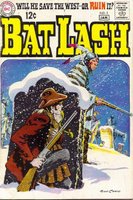Comics have long looked to movies, TV and (in the 1940s and 1950s) to radio for inspiration for new series. Back in the 1950s, DC had many titles that were ported over from TV, including Jackie Gleason and the Honeymooners, Sgt Bilko, Big Town, Mr District Attorney, A Date with Judy, as well as two long-running series featuring the movie stars Bob Hope and Jerry Lewis.
Dell Comics, in particular, went in for licensed features from other media. The appeal is obvious; TV shows and movies have existing fan bases who may be influenced to buy the comics based on their familiarity with the characters and storylines. Of course, one of the ironies today is that the licenses often go the other way, with old-time comic characters making the transition to the big and small screens.
Wagon Train was a hugely successful TV show which ran from 1957-1965. The show featured the adventures of a group of covered wagons crossing the prairies from Missouri to California, shortly after the Civil War. The stories mostly revolved around newcomers to the Wagon Train, and/or the local citizens whom they encountered along the way. This is a common theme in TV, with shows such as Route 66 and Star Trek having many similarities (in fact, Gene Roddenberry reportedly pitched TV executives that Star Trek would be Wagon Train in space). Wagon Train had two main characters; the wagon master Christopher Hale (played by John McIntire) and the scout Flint McCullough (played by Robert Horton).
Note the 15-cent price tag. Dell tried to lead the comics to break the 10-cent barrier on several occasions, starting as early as 1958, but were always frustrated by the reluctance of the other publishers to go along. Finally in late 1961 Marvel and DC raised their prices to 12 cents, while Dell tried to make the higher price stick into 1962 (this comic bears an indicia date of April-June of that year).
The story starts in typical fashion:
It turns out that a renegade Indian and his tribe have been attacking lone wagons along this route, and McCullough strongly advises that they join up with his group. They agree reluctantly, but their stand-offish behavior soon causes problems. In addition, it appears that the man is abusing the "hired man":
When another group mentions that the young man, Jack, had been pistol whipped for talking with another youngster, the wagon master insists that he get medical help for the lad. While they are way from the husband and wife, he tries to draw Jack out on what happened, but is unsuccessful.
Word reaches the wagon train that marshals are looking for a young man and an accomplice who robbed a Wells Fargo stagecoach of $50,000 and killed three people. The description fits Jack. Later, while passing through some mountainous country, the new wagon disappears. They have decided to strike out on their own. Fortunately, the scout comes along just as the renegade Indians attack, and saves them. When the battle is over, the older man shows little gratitude:
Eventually we learn the real secret. Jack's brother and Reed had been responsible for the Wells Fargo robbery, but the brother had gotten away. Reed was holding Jack hostage to force the brother to give him his half of the swag. As the story ends, Reed and Jack's brother have been captured and Jack will be staying behind to testify against them at the trial.
Comments: An interesting and unusually sophisticated tale; I can't help wondering if it's an adaptation of an actual episode of Wagon Train.
The backup tale is of a former circus acrobat and his son. It turns out that the father had lost his grip on his wife and she fell to her death. While the Wagon Train is stopped for a dust storm, the boy wanders off to recapture his pet calf. He is attacked by a mountain lion, and escapes onto an old wooden bridge:
The boy falls onto a rock ledge, where he is stuck. Can the father overcome his fear of heights and save his son from the fate that befell his wife?
Comments: An excellent, well-constructed story. The concept of a character having to overcome his personal phobia in order to save a family member is pretty common in TV and movies.
Overall, this was an excellent comic. Incidentally, the last page includes a circulation statement:
Not too shabby; 314,000 copies per issue was a little more than what the Flash was selling in 1961. As it happens, however, this was the final issue under the Dell imprint; a year and a half later Wagon Train (the comic) appeared as a Gold Key title, but by then the TV show had passed its prime and the comic only lasted four issues.
Subscribe to:
Post Comments (Atom)













2 comments:
I mostly watched the series in reruns, in the afternoons on ABC. They always seemed to show the earlier episodes, where Ward Bond was the Wagon Master.
I also remember the show from reruns. One local station showed the older ones with Ward Bond and Robert Horton. Another ran the later ones with John McIntire and Robert Fuller. I didn't know before your post that Horton was still on the show after Bond died; I had always had the impression that Bond and Horton were replaced at the same time.
Post a Comment